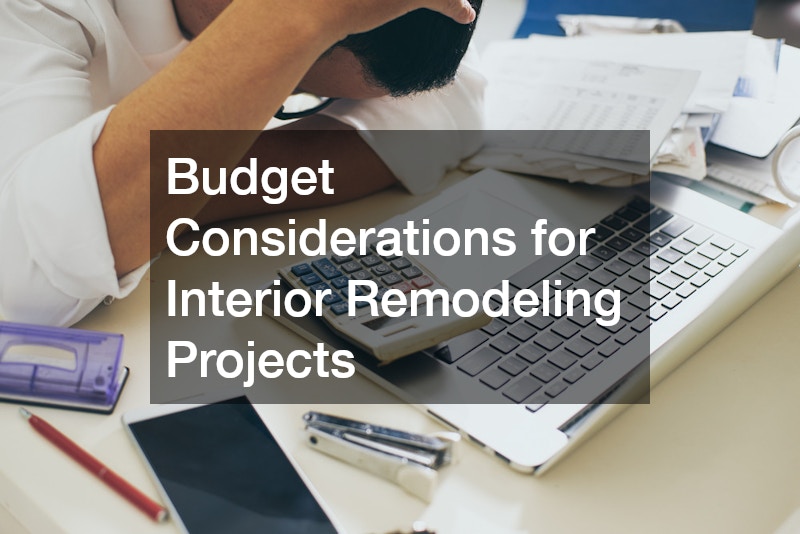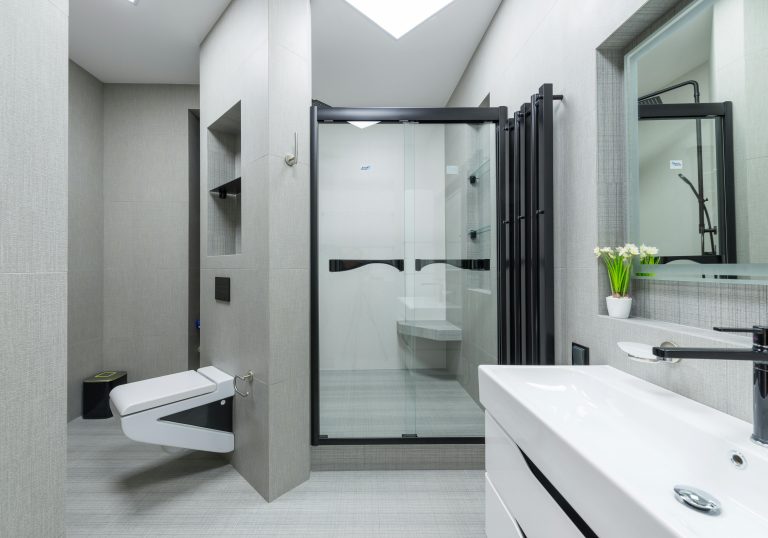

Beginning Your Home Interior Project
Transforming a home into a reflection of personal style and functionality is an aspiration for many homeowners. Whether it’s updating a single room or reimagining an entire house, the process of remodeling requires meticulous planning, design expertise, and professional execution. This is where the role of an interior remodel contractor becomes indispensable. Interior remodel contractors bridge the gap between a homeowner’s vision and the final, tangible result. With their expertise, they provide comprehensive project management, ensuring that each phase—from consultation and design to construction and finishing—runs smoothly. These professionals bring together the necessary skills, materials, and resources to transform spaces efficiently and effectively, enhancing the aesthetic appeal and utility of a home. This wealth of experience will help make the process of planning and execution far easier than if you were to attempt it alone. Without prior home remodeling experience, numerous issues are bound to arise.

Understanding the Role of an Interior Remodel Contractor
An interior remodel contractor plays a pivotal role in turning home renovation dreams into reality. They oversee every aspect of the remodeling process, acting as the main point of communication between homeowners and the various specialists involved in the project. From handling permits and coordinating timelines to managing unexpected challenges, an interior remodel contractor ensures that each element aligns seamlessly with the project’s goals. Their expertise is crucial for maintaining a clear vision and avoiding common pitfalls that can arise during extensive renovations. When homeowners wish to update key areas such as bathrooms, having a contractor ensures a smoother, more organized process.
Specifically, when undertaking a bathroom remodel, an interior remodel contractor collaborates with specialized bathroom remodelers to execute the project to perfection. This includes selecting the right materials, ensuring proper plumbing installation, and creating a cohesive design that matches the rest of the home’s style. Bathroom remodels often involve intricate details like tiling, fixture placement, and optimal use of space—tasks that require precision and experience. By managing these components, the contractor guarantees that the bathroom not only meets aesthetic desires but also functions efficiently in the long term.
Key Qualities of an Effective Interior Remodel Contractor
To ensure a successful remodeling project, it’s vital to choose an interior remodel contractor who possesses essential qualities. Effective contractors demonstrate strong leadership skills, clear communication, and attention to detail. They should be adept at problem-solving, as unexpected issues often arise during renovation projects. Additionally, a reliable interior remodel contractor has a network of skilled professionals, such as electricians, painters, and plumbing experts, whom they can rely on for various phases of the project. This ensures that homeowners receive top-tier service and cohesive results.
On a more specific level, when selecting a remodeling company, it’s important to look for contractors who showcase a proven track record through previous projects and client testimonials. A trustworthy interior remodel contractor will have certifications, insurance, and references that highlight their competence and professionalism. By choosing a contractor who is well-versed in modern trends and classic design principles, homeowners can feel confident that their vision will be respected and realized. Working with a reputable remodeling company provides peace of mind that the contractor will maintain transparency, adhere to timelines, and execute high-quality work that transforms spaces efficiently.

Initial Consultation: Setting the Stage for Success
The initial consultation with an interior remodel contractor is a crucial step in the remodeling process. This meeting sets the foundation for a clear understanding between the contractor and the homeowner. During this phase, the contractor listens to the homeowner’s vision, discusses potential design options, and evaluates the space to understand the scope of the project. Establishing a detailed plan during the consultation helps ensure that both parties share aligned expectations regarding budget, timeline, and the desired outcome. This preliminary step helps identify potential challenges and allows the contractor to provide expert advice on design and functionality.
Specifically, when coordinating with a countertop service provider during the planning phase, an interior remodel contractor ensures that material selection and layout align with the overall vision of the project. This may involve assessing different types of countertop materials, such as quartz or granite, and determining their suitability based on the space’s intended use. By collaborating early on, the contractor can incorporate custom countertop designs into the remodeling plan, making the space both visually appealing and practical.
Planning and Designing Your Interior Space
A well-thought-out plan is the backbone of any successful remodeling project. An interior remodel contractor brings valuable expertise to the planning and design stage, working closely with the homeowner to create a space that balances style, comfort, and functionality. This process involves mapping out the layout, selecting materials, and making informed choices about design elements that complement the overall theme of the home. With a detailed plan, the contractor can foresee potential issues and adjust the design to maximize space utilization and ensure structural integrity.
When collaborating with specialists such as a local paving contractor for projects that extend to outdoor spaces, an interior remodel contractor considers the continuity between indoor and outdoor areas. Whether it’s ensuring smooth transitions from living rooms to patios or selecting complementary materials, the contractor’s oversight ensures the remodel maintains a cohesive look. Proper planning allows the project to flow seamlessly from the interior to the exterior, enhancing the home’s overall aesthetic and functionality.

Budget Considerations for Interior Remodeling Projects
Budgeting is a critical aspect of any remodeling project, and an experienced interior remodel contractor knows how to navigate it efficiently. Contractors help homeowners set a realistic budget based on the scope of work, materials chosen, and labor involved. They provide detailed cost estimates and can suggest cost-effective alternatives that do not compromise on quality. Transparent communication about budget expectations helps prevent unforeseen expenses and keeps the project within financial boundaries.
For example, when working with a roofing contractor as part of a larger remodeling project, an interior remodel contractor ensures that the overall budget includes any necessary roof repairs or upgrades. This may involve selecting durable, cost-effective materials and scheduling the roofing work to align with the interior updates. By managing these aspects, the contractor helps maintain a balance between desired outcomes and budgetary constraints, ensuring a successful project from start to finish.
Managing Timelines and Project Deadlines
Maintaining a clear and realistic timeline is vital for the success of any remodeling project. An interior remodel contractor is responsible for coordinating different phases of the project and managing multiple teams to ensure each step is completed on time. They create a comprehensive project schedule that accounts for design planning, material procurement, and construction phases. This detailed planning helps avoid delays and keeps the project on track. By closely monitoring the progress, the contractor can adjust the timeline as necessary and communicate changes to the homeowner, ensuring transparency throughout the process.
Specifically, when the project involves tasks like tree removal or landscape work by a tree company, an interior remodel contractor coordinates with these professionals to align their work with the remodeling schedule. For instance, if outdoor access is required during construction, tree removal must be completed early to avoid potential delays. By managing these dependencies, the contractor ensures that all work proceeds smoothly and that timelines are met without disrupting the project’s flow.

Collaborating with Your Interior Remodel Contractor
Collaboration between the homeowner and the interior remodel contractor is key to achieving a successful remodel. This partnership involves regular communication, shared decision-making, and ongoing feedback. The contractor acts as a guide, helping the homeowner make informed choices while also ensuring that their preferences are incorporated into the project. Regular updates, site visits, and progress reviews keep the homeowner informed and engaged. This collaborative approach not only enhances trust but also allows the project to evolve in line with the homeowner’s vision.
In more specific terms, collaboration may include decisions about wall colors, finishes, and custom design elements, such as those provided by an interior painting service. An interior remodel contractor facilitates these decisions by providing samples, discussing the pros and cons of various options, and aligning them with the overall design scheme. This collaborative effort ensures that each detail contributes to the cohesive look of the remodel, creating a space that feels personalized and well-crafted.
Overcoming Common Remodeling Challenges
Remodeling projects often come with their share of challenges, ranging from unexpected structural issues to supply chain delays. An experienced interior remodel contractor is equipped to handle these challenges effectively. By anticipating potential problems and having contingency plans in place, they can minimize disruptions to the project. Contractors use their expertise to find solutions quickly, whether that means adjusting the project timeline, sourcing alternative materials, or reworking design plans to accommodate new constraints. This proactive approach helps keep the project moving forward and reduces homeowner stress.
For example, if electrical updates are needed and involve coordinating with a residential electrician, an interior remodel contractor manages the integration of these tasks. This might include updating wiring, installing new fixtures, or ensuring that electrical components comply with local building codes. By working closely with electricians and other specialists, the contractor addresses challenges promptly, ensuring that the remodeling project meets safety standards and stays on schedule.
Ensuring Quality and Consistency in the Final Result
One of the most critical roles of an interior remodel contractor is to ensure that the completed project meets high standards of quality and consistency. Throughout the remodeling process, the contractor oversees each phase, checking that work is performed according to the agreed-upon design and specifications. This involves detailed inspections, coordination with skilled tradespeople, and ensuring that each aspect of the project aligns with the homeowner’s vision. Quality control measures help prevent issues that could compromise the final outcome, giving homeowners confidence in the durability and aesthetics of their updated space.
More specifically, when the project includes integrating air conditioning or other HVAC components, the interior remodel contractor collaborates with HVAC specialists to ensure that installation is done correctly and seamlessly integrates with the design. This includes selecting efficient systems that do not disrupt the layout and ensuring proper airflow throughout the renovated areas. By managing these details, the contractor helps maintain comfort and functionality, resulting in a remodel that not only looks beautiful but performs effectively.
Evaluating the Completed Interior Remodel Project
The final phase of a remodeling project involves evaluating the completed work to ensure it aligns with expectations. An interior remodel contractor conducts a thorough walkthrough with the homeowner, checking each detail and verifying that the work meets the original design plan and quality standards. This step allows for any necessary adjustments or touch-ups to be identified and addressed before the project is officially completed. Clear communication and transparency during this phase foster trust and satisfaction, ensuring the homeowner feels confident and pleased with the final result.
In more specific terms, if skylight installation was part of the project, the contractor will ensure that it is properly sealed, allows for the intended natural light, and complements the room’s overall design. They will check that there are no leaks or structural concerns and that the installation meets all safety codes. This attention to detail ensures that every element of the project is fully functional and visually cohesive, highlighting the value of having a dedicated interior remodel contractor oversee the process from start to finish.
Maintaining Your New Home Changes
The journey of transforming a home can be both exciting and challenging, but working with an experienced interior remodel contractor makes the process far more manageable. These professionals bring invaluable expertise, from initial consultations to final evaluations, ensuring that projects run smoothly and efficiently. Their role encompasses managing timelines, collaborating with skilled tradespeople, overseeing quality control, and addressing unforeseen challenges, all while keeping the homeowner’s vision at the forefront. Whether the remodel involves updating a single room or renovating an entire home, a skilled contractor can make all the difference in achieving a beautiful, functional, and lasting space. By choosing the right interior remodel contractor, homeowners can enjoy the peace of mind that comes with knowing their remodeling project is in capable hands.


